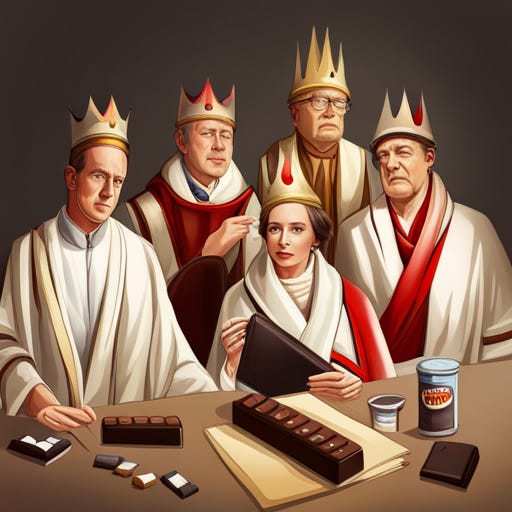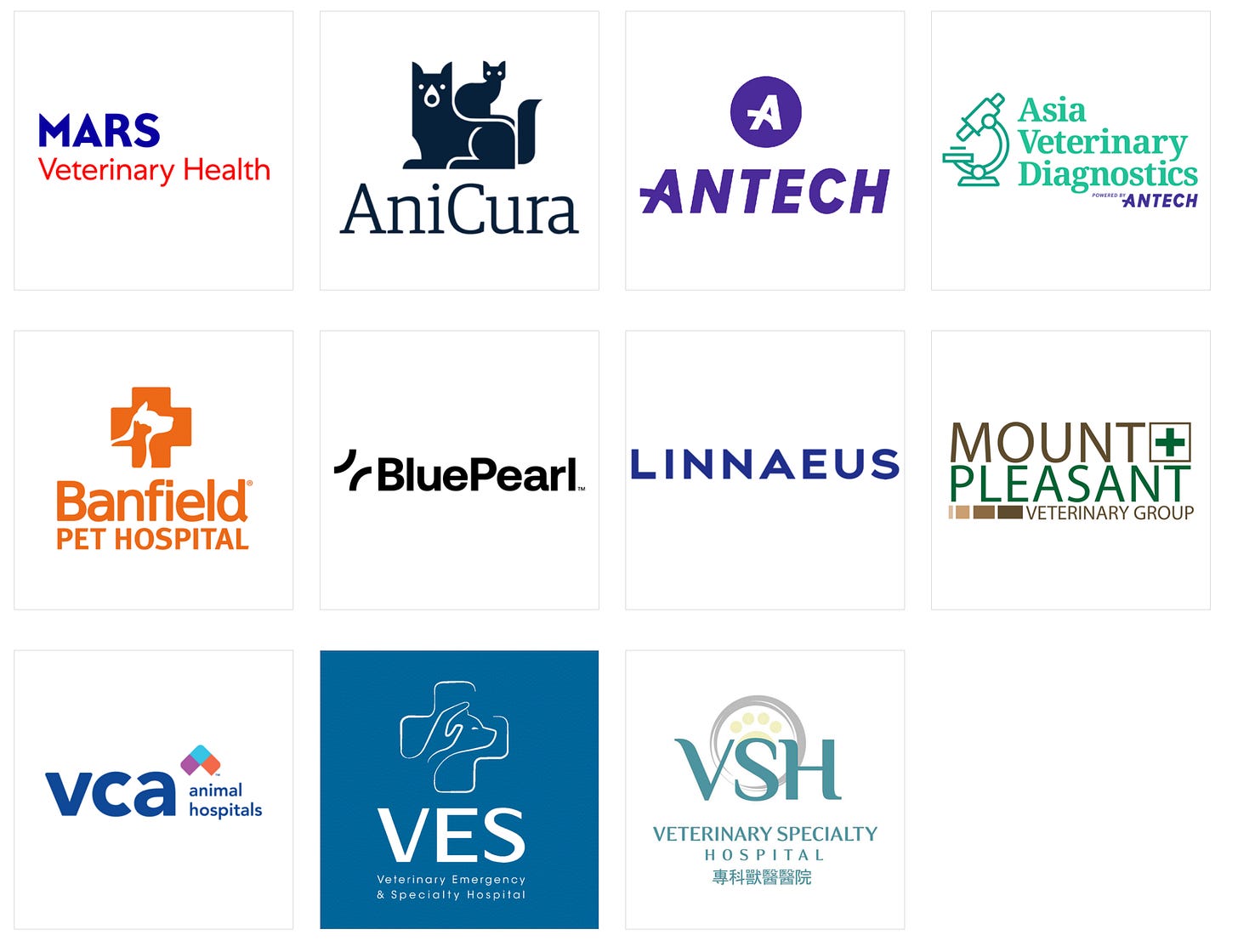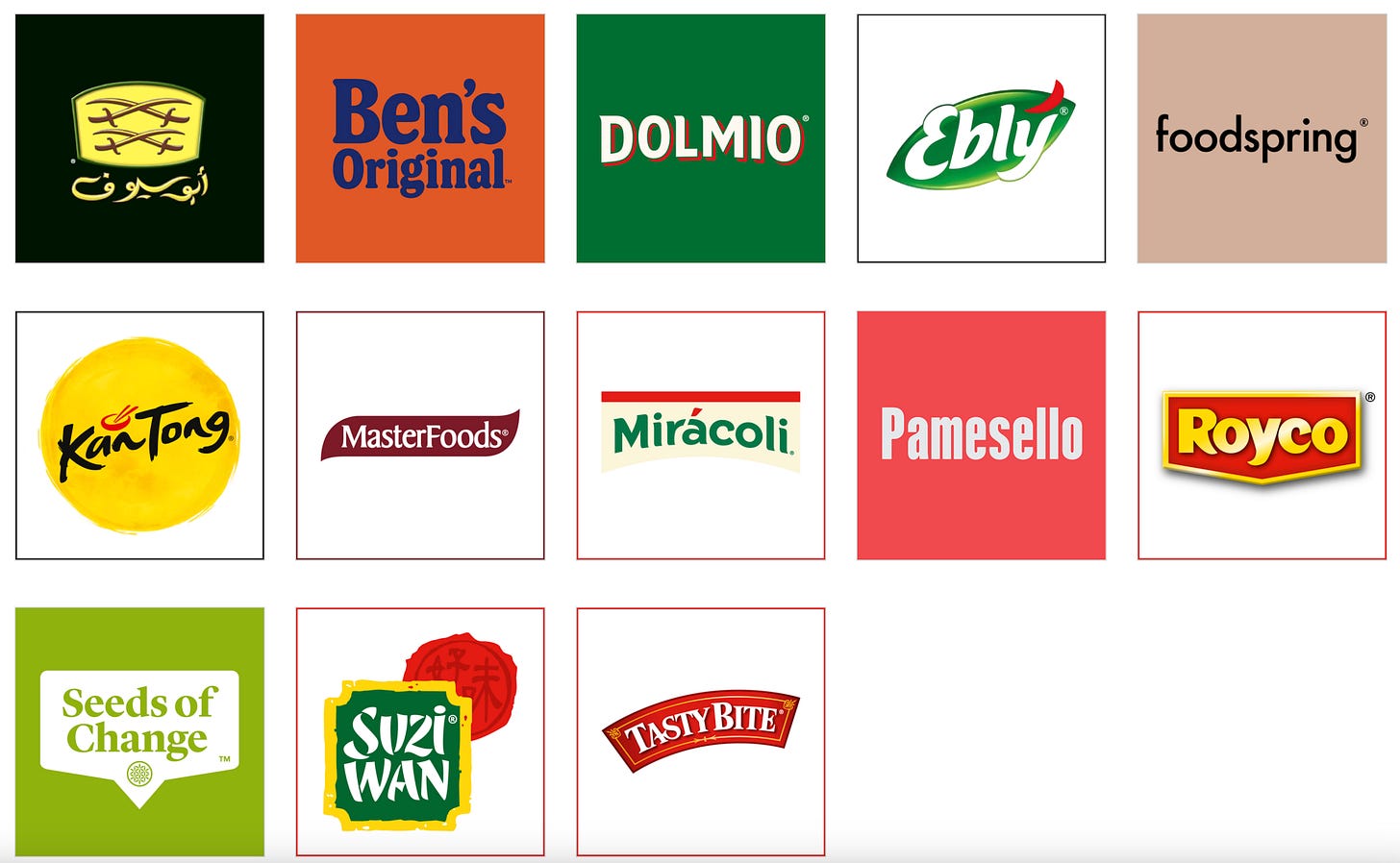All hail the Chocolate Oligopoly
The unlikely tale of chocolate, pet food and ... Mr. Beast.
All hail the Chocolate Oligopoly
An oligopoly is like a monopoly except it’s a sector of the economy ruled by a few corporations instead of one. America has lots of oligopolies, we’re full of them!
If you need insulin there are only three companies to go through — Eli Lilly, Sanofi, and Novo-Nordisk.
If you want to run an internet search it’ll probably be through Google or Microsoft.
If you want to buy something online it’ll probably be from Amazon, Target or Walmart.
If you have a prescription to pickup it’ll be from CVS or Walgreens.
If you go to the grocery store it’ll probably be one owned by Kroger-Albertsons. Though this merger might actually be challenged by the court..
If you have a headache from all this and want to have a beer it’ll probably be made by Anheuser-Busch InBev, which is a Belgian company and it’s basically a rollup of rollups the owns most of the beer brands you see.
There are lots of monopolies and oligopolies in America but today we’re going to talk about one: the chocolate monopolies… and, weirdly, pet food too.
Chocolate in the United States is ruled by an oligopoly of two companies:. Hershey's and Mars. There’s a few other producers like a Swiss company that owns Lindt and Ghirardelli, plus there’s Nestle, which owns Kit Kat, and globally Cadbury is a big player but for the most part if you’re buying chocolate in America, no matter where you live in the country, you’ll be buying from Mars or Hershey’s.

Now if you’re a fancy lawyer at a big law firm that represents Hershey’s or Mars you’re probably going to say there’s lots of competition out there and that two companies controlling half the market isn’t that big of a deal and certainly isn’t illegal. They’ll argue people just want to punish their success. Besides they’ll say, anyone can start their own chocolate company and compete, that’s what makes America great.
Chocolate in the United States is ruled by an oligopoly of two companies:. Hershey's and Mars.
Let’s dig into those claims, first we can look at starting our own chocolate company from an unlikely source: Mr. Beast.
Can’t anybody just start your own chocolate company?
Mr. Beast has 166 million subscribers on YouTube and recently started his own chocolate company called Feastables for his rabid fans. On the surface this seems to be how the American economy is supposed to work. If there are dominant, complacent companies ruling an industry new, innovative companies can build their own products and out compete. Producers are free to produce and the consumers benefit from corporate competition. After-all, there are tons of resources on the internet about starting a new business and I’m sure there are tons of videos about how to make chocolate. Mr. Beast started a new chocolate company to attack entrenched players, end of story. I can already hear the Libertarians: let the free market do its thing, get the government out of the way!
In a recent interview he acknowledged the dominance of Hershey’s and Mars and two ways they exercise their power: through buying upstart competitors and exclusive contracts for them to control shelf space.
“Hersey’s and Mars do 75% of the chocolate revenue in America. It’s kind of monopolistic, almost. Like if you have a successful chocolate company they’ll just buy you or just bully you so you don’t get shelf space” - Mr. Beast
Hershey’s and Mars control distribution so even if someone raises plenty of capital and makes a better product they won’t be able to get it in front of consumers. I’m sure part of this has to do with the dominance of firms like Target and Wal-Mart and the deals they strike with Hershey’s and Mars. Even getting into these big stores can be a challenge. They demand massive scale and have systems like Electronic Data Interchange (EDI) for managing inventory where you have to buy or build expensive software. For context, this is what a request for chocolate might look like coming from Target to your chocolate business:

If you don’t deliver on that request you could be ruined. Or perhaps even if you do deliver the terms could be so unfavorable that if your chocolate doesn’t sell you’d be ruined anyways. One coffee company was grifted by a multi-billion dollar distributor landing themselves in $200,000 in debt while the nation-wide retailer walked away risk free.
If anything lawyers or advocates for Hershey’s and Mars might claim that their power is necessary to counterbalance the power of big retailers like Target and Wal-Mart! The solution to big, powerful, dominant corporations though is not more big powerful dominant corporations.
Next let’s look at how powerful these chocolate companies really are..
Mars, Incorporated
Mars, Incorporated is, somewhat surprisingly a private company. It’s one of the largest private companies in America and the Mars family, worth $94 billion, is the country's third-wealthiest family after the Waltons and the Kochs. There are clear problems for democracy and society with this kind of wealth concentration. Supreme Court Justice Louis Brandeis summarized it best in 1941:
“We can have democracy in this country, or we can have great wealth concentrated in the hands of a few, but we can’t have both.”
-Supreme Court Justice Louis Brandeis
This wealth inequality is bad for society and un-democratic in the sense that people with this much money can pressure, co-opt and bribe democratically elected politicians. It’s also just plain not decent, but let’s table all that for a minute and look at how Mars, Incorporates operates.
The current incarnation of Mars, Incorporated was started by Franklin Clarence Mars in 1920 in Minneapolis after a failed attempt to launch in Tacoma, Washington in 1911. They launched Milky Way in 1923. They moved the headquarters to Chicago and launched Snickers in 1930 and in 1932 launched the 3 Musketeers bar. Up until about the 1960s chocolate production in the United States was largely regional. As current chairwoman of the FTC Lina Khan explains in her 2013 article Why So Little Candy Variety? Blame the Chocolate Oligopoly:
Candy was a sprawling and diverse industry at that time, run by confectionery tinkerers who tirelessly stirred and tweaked to dish up new sweets. To distinguish their creations, producers pegged treats to national sports stars, disgraced politicians, or even the local preacher. There was the Winning Lindy bar for Charles Lindbergh, the Dr. IQ bar for a ’30s radio quiz show, and the Oh Henry! bar named after the guy who moved barrels of corn syrup at one manufacturer’s candy plant.
Within the past 25 years though Mars, Incorporated has gotten bigger, more powerful and bought up rivals. Independent candy producers like the Idaho Candy Company are a dying breed. Their dominance goes well beyond candy too.
Pet food brands Mars, Incorporated owns
Mars’ dominance in candy has enabled them to dominate pet food as well. The industry is controlled by them and Nestle.

Mars owns popular pet food brands like Pedigree, which it started, and Iams which it bought from Proctor and Gamble in 2014 for $2.9 billion in cash. Mars bought Doane Petcare Company, a leading dog food supplier for Wal-Mart for hundreds of millions of dollars back in 2006 and in 2002 Mars bought Royal Canin a French dogfood company for 1.5 billion Euros. Mars has spent billions buying up competitors and consolidating the industry. Their dominance comes largely from this financial engineering instead of out competing with quality products.
In addition to dominating pet food Mars has expanded into other pet adjacent industries like veterinary care as well.
Veterinary and pet diagnostic services Mars, Incorporated owns
Mars is a dominant player in the veterinary space, forcing out and co-opting smaller practices in that industry.
In 2007 Mars bought Banfield Pet Hospital that runs over 1,000 clinics within PetSmart stores.
In 2015 Mars bought BluePearl Veterinary Partners making Mars, according to their own press release, “the largest pet nutrition and veterinary care provider in the world”.
In 2017 Mars expanded further buying VCA Animal Hospitals paid $9.1 Billion to acquire .
Mars acquired Wrigley for $23 billion in 2008. The resulting division of Mars is Mars Wrigley. Here are the candy brands Mars Wrigley owns:
In November 2020, Mars acquired full ownership of snack food company Kind North America which made Kind bars for $5 billion.[38]
In December 2022, it was announced Mars had acquired the West Valley City-headquartered whole-fruit snacking brand, Trü Frü.
Mars acquired a lot of pet care companies. Mars owns several pet-food brands, including Iams, Pedigree and Royal Canin
Mars owns over 800 petcare hospitals and makes 20% of its revenue from pet-related business lines. Half of Mars' 140,000 employees work for its veterinary business. It makes more revenue than Cocoa Cola.
FTC action
Regulatory Muzzle: Mars' pet business might be even bigger if it weren't for scrutiny from the US Federal Trade Commission. Mars agreed to divest 12 veterinary clinics to three different rival pet services companies after the FTC said its VCA acquisition was an antitrust threat. Earlier this month, the FTC also required veterinary chain JAB Consumer Partners to divest clinics in order to complete an acquisition. When it comes to petcare, the FTC apparently is more territorial than a rottweiler.
Hershey Co
The largest shareholders in Hershey’s are Vanguard, BlackRock and State Street. Mars is one of the largest privately held companies in the world with $45 billion in annual sales; that’s even more than the Coco-Cola company’s $38 billion in annual sales.








